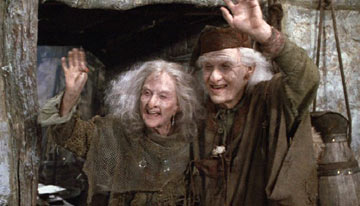I was working on background for my Camp NaNoWriMo next month, specifically on a group of wizards. They reside in something like a library / monastery / university. As I was working through exactly those details, it hit me: there are no married wizards.
I'm sure the Present Company will instantly spring forward with counter-examples, and I'll be glad to hear of them, but the normal image is that the wizard is not only single, he's not even involved. The only thing rarer than a wizard's wife is probably a female wizard. ;-)
The problems are obvious. Married people, regardless of gender, tend to be settled. It's the single person who can move about freely, and in most stories, a wizard must be free to be trotted in and out of the story at need. It's a little bit like why the Farmboy of Destiny is so often an orphan.
But it's worth thinking about how wizards might be married and how that might add to a story. Three models come to mind for my own context. One is the university professor; more specifically, the professor of the Franco-Germanic type, post-Reformation and pre-20thc. A man of prestige and weight in a community was almost by definition married. It conferred respectability. Once we get to the 20thc we get the eccentric professorial bachelor, but that's a different trope.
A second model is the guild master. Here again, in most European cities, the master was by definition married. In many cities, you couldn't even attain mastership as a bachelor. Whereas the professor lives in the university, or nearby, the guildsman merely needs to live in the city, but the guild provides a point of contact, serves as drinking club, and so on.
The third model is the international merchant. These guys, especially in the Central Middle Ages, usually resided at home with the famiglia but would, from time to time, journey to another city in order to transact business. Some of these guys traveled very widely, by land and sea, and could be gone months or even years. Yet, again, they were usually married, though often not until pushing thirty.
With the first two models we have communities of wizards, or we could have. That is, it could be a wizardly university and a wizardly guild, though it would be possible for either to be a "normal" guild, but that it has a wizard in it.
Anyway, I think there's room for the married wizard. That can lead to all kinds of interesting developments. The wizard's spouse could also be a wizard. The kids might be (now we're getting into the Invincibles). Life in the neighbors could get ... interesting. A wizardly courtship could be fun, and a wizardly break-up could be even more fun. Growing up wizard in itself would make a good story.
I admit the above is a little random, but I hope it sparks some ideas in someone else.
I'm sure the Present Company will instantly spring forward with counter-examples, and I'll be glad to hear of them, but the normal image is that the wizard is not only single, he's not even involved. The only thing rarer than a wizard's wife is probably a female wizard. ;-)
The problems are obvious. Married people, regardless of gender, tend to be settled. It's the single person who can move about freely, and in most stories, a wizard must be free to be trotted in and out of the story at need. It's a little bit like why the Farmboy of Destiny is so often an orphan.
But it's worth thinking about how wizards might be married and how that might add to a story. Three models come to mind for my own context. One is the university professor; more specifically, the professor of the Franco-Germanic type, post-Reformation and pre-20thc. A man of prestige and weight in a community was almost by definition married. It conferred respectability. Once we get to the 20thc we get the eccentric professorial bachelor, but that's a different trope.
A second model is the guild master. Here again, in most European cities, the master was by definition married. In many cities, you couldn't even attain mastership as a bachelor. Whereas the professor lives in the university, or nearby, the guildsman merely needs to live in the city, but the guild provides a point of contact, serves as drinking club, and so on.
The third model is the international merchant. These guys, especially in the Central Middle Ages, usually resided at home with the famiglia but would, from time to time, journey to another city in order to transact business. Some of these guys traveled very widely, by land and sea, and could be gone months or even years. Yet, again, they were usually married, though often not until pushing thirty.
With the first two models we have communities of wizards, or we could have. That is, it could be a wizardly university and a wizardly guild, though it would be possible for either to be a "normal" guild, but that it has a wizard in it.
Anyway, I think there's room for the married wizard. That can lead to all kinds of interesting developments. The wizard's spouse could also be a wizard. The kids might be (now we're getting into the Invincibles). Life in the neighbors could get ... interesting. A wizardly courtship could be fun, and a wizardly break-up could be even more fun. Growing up wizard in itself would make a good story.
I admit the above is a little random, but I hope it sparks some ideas in someone else.

 Sage
Sage
 Auror
Auror
 Myth Weaver
Myth Weaver